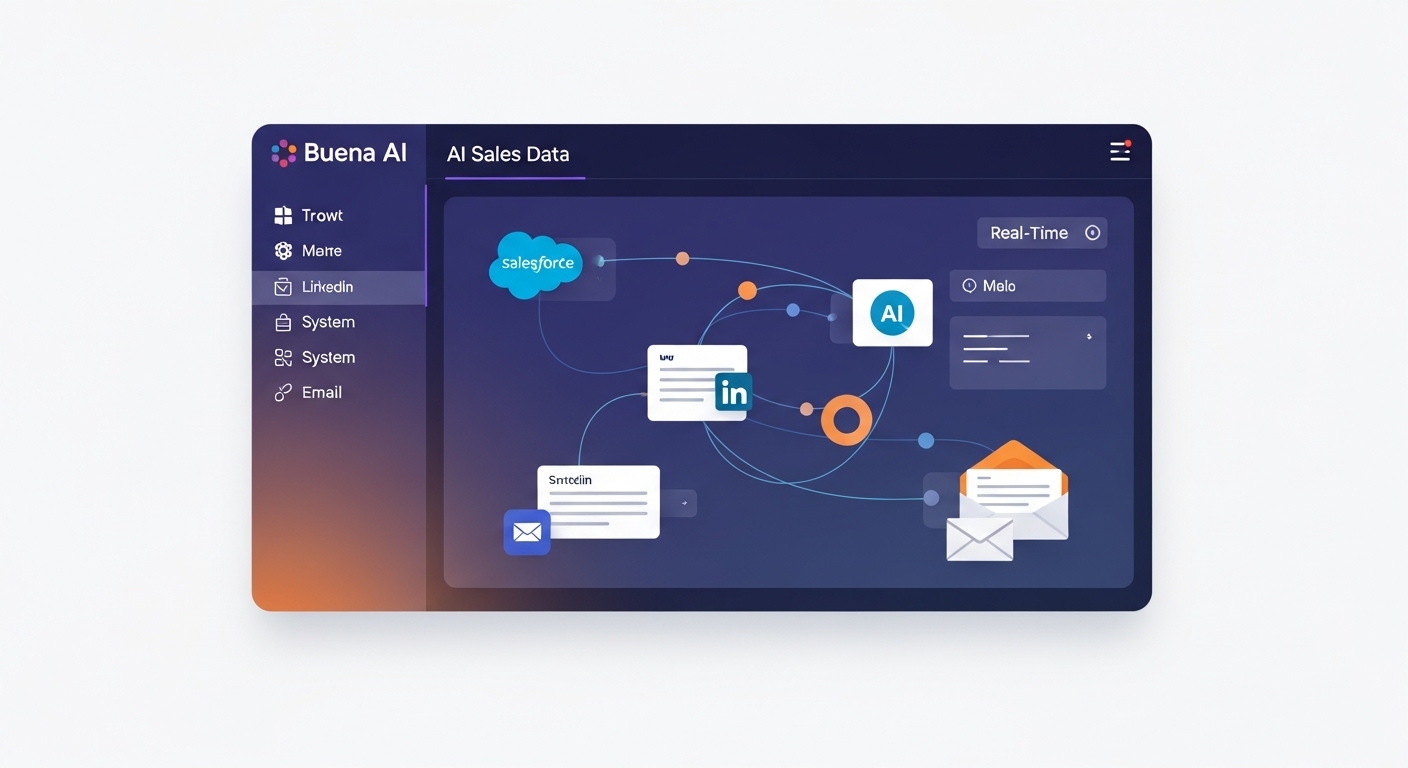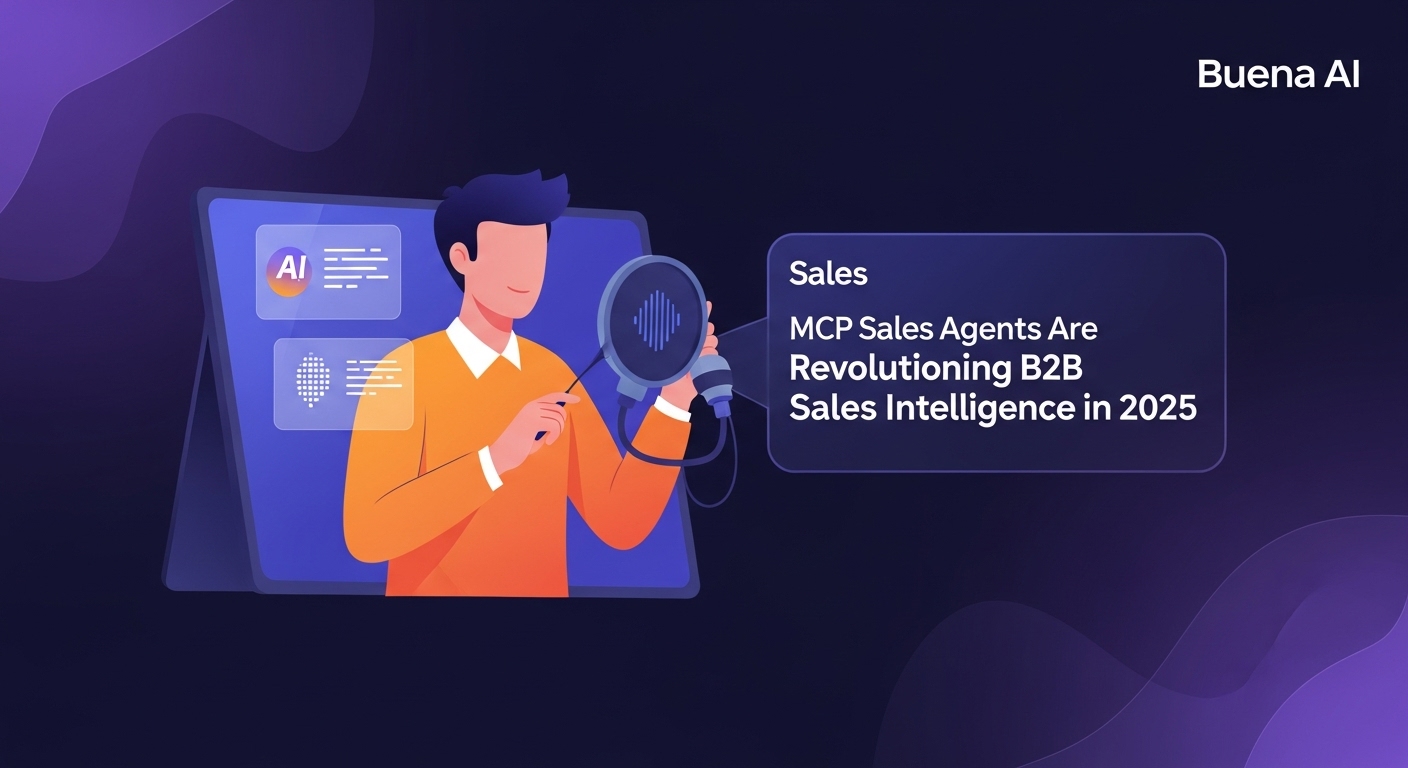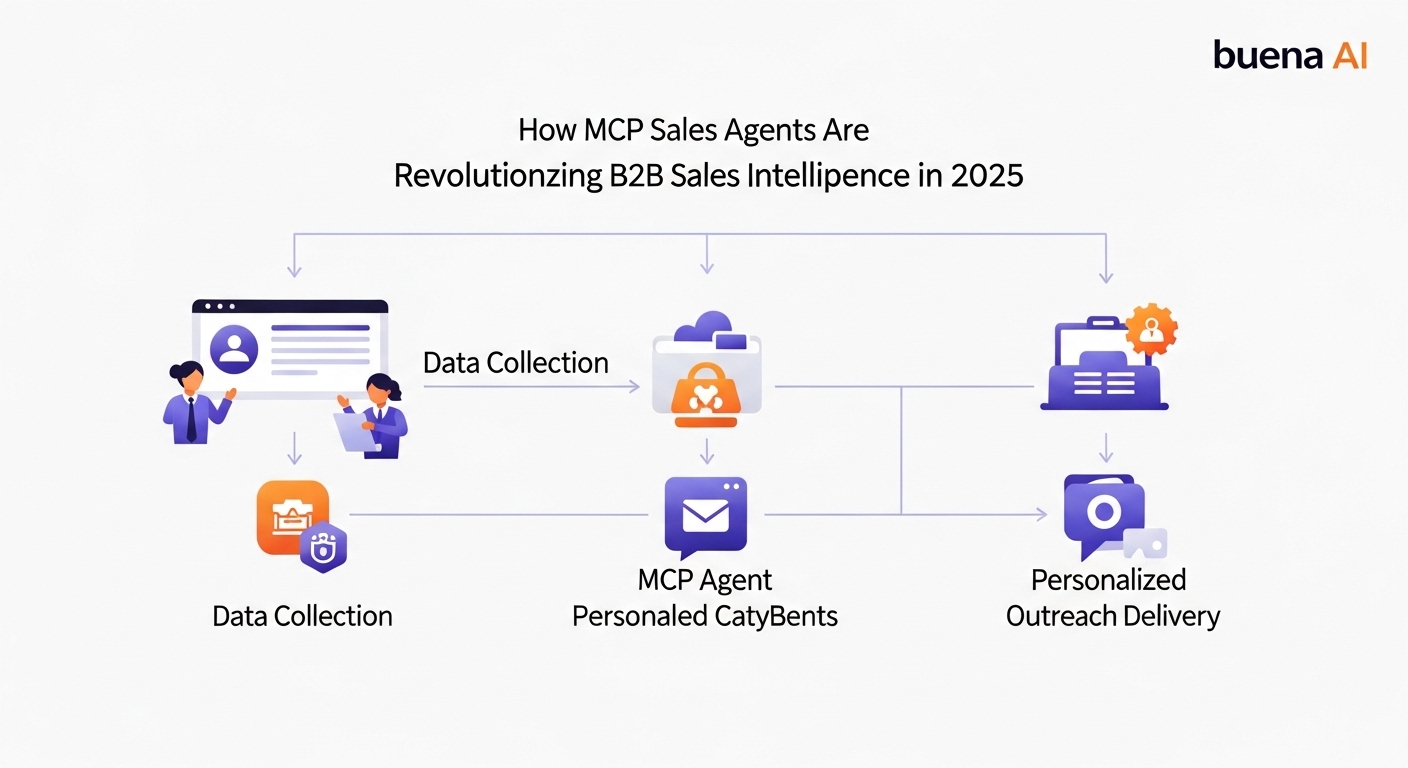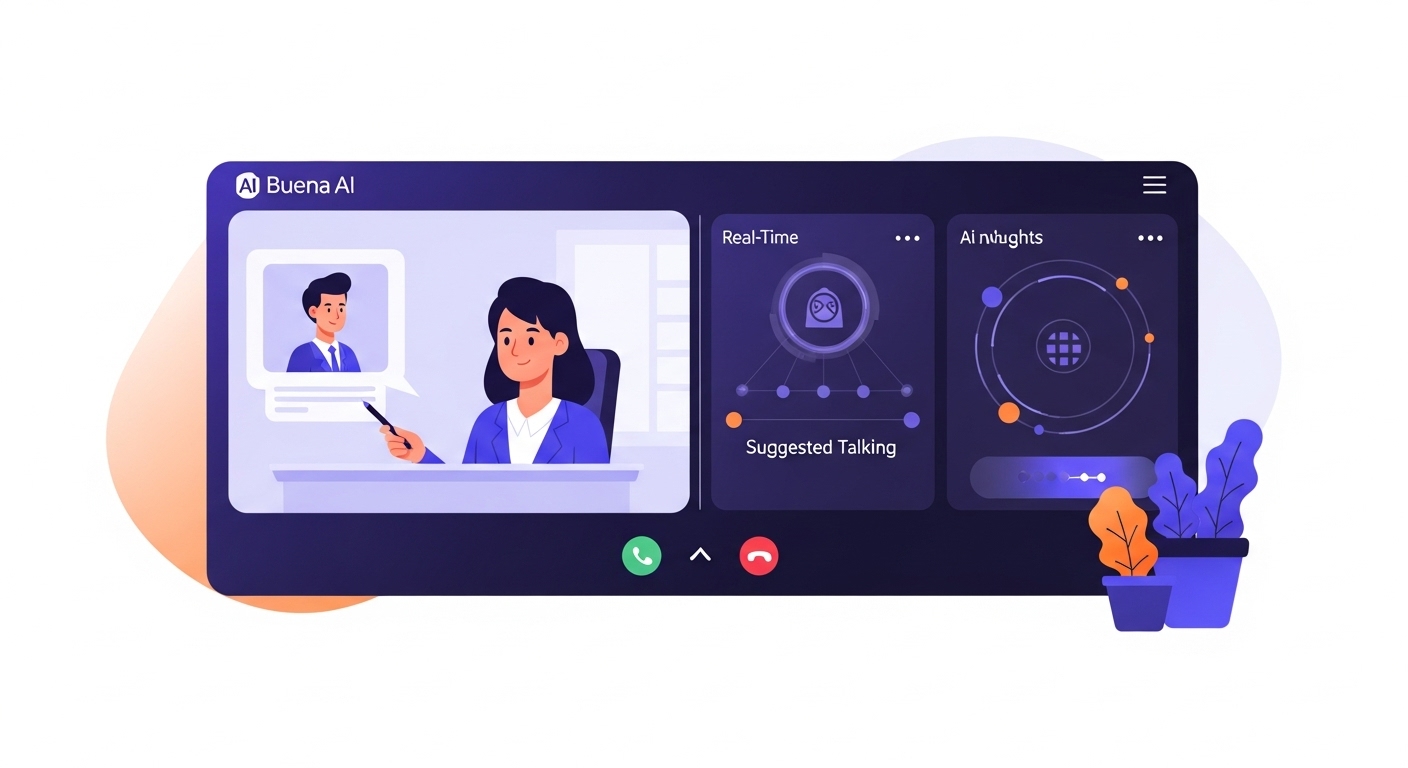How MCP Sales Agents Are Revolutionizing B2B Sales Intelligence in 2025
The B2B sales landscape is experiencing a seismic shift. While traditional sales tools operate in isolation, a new breed of MCP sales agents powered by Model Context Protocol is emerging as the game-changer that sales leaders have been waiting for. These aren't your typical chatbots or basic automation tools—they're intelligent systems that can access, analyze, and act on your entire sales ecosystem in real-time.
According to recent industry research, companies implementing AI-powered sales intelligence see an average 30% increase in qualified leads and 25% improvement in conversion rates. But here's the catch: most AI sales tools today are limited by data silos and disconnected systems. That's where MCP changes everything.
What Makes MCP Sales Agents Different from Traditional Sales AI
Model Context Protocol (MCP) represents a fundamental breakthrough in how AI agents interact with business systems. Unlike traditional sales AI that relies on static data imports or limited API connections, next generation sales agents built on MCP can dynamically access and orchestrate data across your entire sales tech stack.
Think of MCP as the universal translator between your AI agents and your business systems. Whether it's Salesforce, HubSpot, LinkedIn Sales Navigator, or your custom databases, MCP enables seamless, real-time data flow without the typical integration headaches.
The Technical Advantage
Traditional sales AI tools face three critical limitations:
- Data Staleness: Information becomes outdated quickly in fast-moving sales cycles
- System Fragmentation: Customer data scattered across multiple platforms
- Context Loss: AI lacks complete picture of prospect interactions
MCP solves these issues by creating a standardized bridge that allows AI agents to operate tools exactly as humans would, but with superhuman speed and consistency.
 AI sales dashboard showing real-time data connections across multiple platforms including Salesforce, LinkedIn, and email systems
AI sales dashboard showing real-time data connections across multiple platforms including Salesforce, LinkedIn, and email systems
Real-World Applications: How MCP Transforms B2B Sales Workflows
The practical applications of MCP in B2B sales are already proving transformative. Here are the key areas where sales teams are seeing immediate impact:
Intelligent Lead Qualification
MCP-powered agents can instantly cross-reference prospect data across multiple systems to provide comprehensive lead scoring. For example, an agent might simultaneously check:
- Company financial health from your CRM
- Recent hiring patterns from LinkedIn
- Technology stack from intent data providers
- Previous interaction history from email platforms
This holistic view enables sales reps to prioritize prospects with 87% accuracy—a significant improvement over traditional lead scoring methods.
Dynamic Personalization at Scale
One of the most powerful applications involves dynamic content generation. MCP agents can pull real-time data about a prospect's company, recent news, mutual connections, and buying signals to create highly personalized outreach messages that achieve 3x higher response rates than generic templates.
For instance, when reaching out to a VP of Sales at a growing SaaS company, the agent might reference their recent Series B funding, mention a mutual connection from LinkedIn, and highlight how similar companies in their space have solved specific challenges.
Voice-Enhanced Engagement
Modern MCP implementations are incorporating voice technology to create more human-like interactions. Sales teams using voice-note outreach through platforms like LinkedIn are seeing 2x higher response rates compared to traditional text-based messages.
 Sales rep recording personalized voice message with AI-generated talking points displayed on screen
Sales rep recording personalized voice message with AI-generated talking points displayed on screen
The Enterprise Data Challenge: Why Traditional AI Falls Short
Enterprise sales organizations face a unique challenge: their most valuable data is often trapped in silos. Customer relationship data lives in Salesforce, communication history sits in email platforms, social insights are locked in LinkedIn Sales Navigator, and financial information resides in separate systems.
Traditional AI solutions require extensive data migration, complex integrations, or settle for incomplete information. This leads to what industry experts call "AI hallucinations"—responses based on partial or outdated information that can damage customer relationships.
The MCP Solution
MCP addresses this challenge through its standardized protocol that enables AI agents to:
- Access data on-demand: No need for bulk data transfers or syncing
- Maintain data freshness: Always working with the most current information
- Preserve data governance: Respects existing security and privacy controls
- Scale efficiently: Handles enterprise-level data volumes without performance degradation
This approach is particularly valuable for sales teams managing thousands of prospects across multiple verticals and geographies.
Building Your MCP Sales Agent Strategy: A Practical Framework
Implementing MCP sales agents requires a strategic approach. Based on successful deployments across various B2B organizations, here's a proven framework:
Phase 1: Data Ecosystem Mapping
Start by identifying all systems containing valuable sales data:
- CRM platforms (Salesforce, HubSpot, Pipedrive)
- Communication tools (email, LinkedIn, phone systems)
- Intent data providers (Bombora, 6sense, G2)
- Financial and company data sources
- Marketing automation platforms
Phase 2: Use Case Prioritization
Focus on high-impact, low-complexity use cases first:
- Lead enrichment: Automatically enhance prospect profiles
- Trigger-based outreach: Respond to buying signals in real-time
- Meeting preparation: Generate comprehensive prospect briefings
- Follow-up automation: Personalized sequences based on interaction history
Phase 3: Implementation and Optimization
Deploy MCP agents incrementally, starting with your most experienced sales reps who can provide valuable feedback on AI-generated insights and recommendations.
 Flowchart showing MCP agent workflow from data collection to personalized outreach delivery
Flowchart showing MCP agent workflow from data collection to personalized outreach delivery
Measuring Success: KPIs for MCP Sales Agent Performance
The best sales AI implementations are measured not just by technological sophistication, but by tangible business outcomes. Key performance indicators for MCP sales agents include:
Efficiency Metrics
- Time to lead qualification: Reduction from hours to minutes
- Research time per prospect: 80% reduction in manual research
- Personalization scale: 10x more personalized touchpoints per rep
Effectiveness Metrics
- Response rates: 3x improvement in email responses
- Meeting booking rates: 2x increase in qualified meetings
- Pipeline velocity: 25% faster deal progression
Quality Metrics
- Lead quality scores: 87% accuracy in intent prediction
- Message relevance: Measured through engagement metrics
- Sales rep satisfaction: Adoption rates and feedback scores
The Future of B2B Sales: Human-AI Collaboration
The most successful MCP implementations don't replace sales professionals—they amplify their capabilities. The future of B2B sales lies in human-guided AI that combines the analytical power of machines with the emotional intelligence and relationship-building skills of experienced sales professionals.
Sales reps equipped with MCP agents can focus on high-value activities like strategic relationship building, complex deal negotiation, and customer success initiatives, while AI handles data analysis, research, and routine communications.
This collaboration model is already showing remarkable results. Sales teams using AI-powered platforms report 40% more time available for direct customer interaction and 35% improvement in deal closure rates.
 Split screen showing sales rep in video call with prospect while AI dashboard provides real-time insights and suggested talking points
Split screen showing sales rep in video call with prospect while AI dashboard provides real-time insights and suggested talking points
Overcoming Implementation Challenges
While the benefits of MCP sales agents are compelling, successful implementation requires addressing common challenges:
Data Quality and Governance
Ensure your underlying data is clean and well-structured. MCP agents are only as good as the data they can access. Implement data governance policies that balance accessibility with security.
Change Management
Sales teams may initially resist AI-powered tools. Focus on demonstrating clear value and providing comprehensive training. Start with your most tech-savvy reps as champions.
Integration Complexity
While MCP simplifies connections, enterprise environments can still be complex. Work with experienced implementation partners who understand both the technical and business requirements.
Conclusion: The MCP Advantage in Modern Sales
Model Context Protocol represents more than just another sales technology—it's the foundation for the next generation of intelligent sales operations. By enabling AI agents to access and orchestrate enterprise data in real-time, MCP is solving the fundamental challenge that has limited AI adoption in B2B sales: the inability to work with complete, current information.
The early adopters of MCP sales agents are already seeing significant competitive advantages: faster lead qualification, more personalized outreach, improved conversion rates, and sales teams that can focus on what they do best—building relationships and closing deals.
As we move into 2025, the question isn't whether AI will transform B2B sales—it's whether your organization will be among the leaders leveraging these powerful new capabilities or playing catch-up with competitors who moved first.
The future of sales is here, and it's powered by intelligent agents that understand your entire business ecosystem. The time to act is now.
Stay Ahead of Sales AI Trends
Get exclusive insights on the latest sales AI developments and proven strategies delivered weekly
Related Articles
AI In Sales Development System: Expert Tips and Strategies for Success
Transform your sales development with AI-powered strategies. Learn expert tips to implement AI systems that drive 3x higher response rates and accelerate pipeline growth.
AI Sales Agents Infrastructure Platform: Expert Tips and Strategies for Success
Master AI sales agents infrastructure platforms with expert tips and strategies. Learn how to optimize your B2B sales process and drive better results with proven implementation tactics.
How Does AI Sales Agents Work: Expert Tips and Strategies for Success
Learn how AI sales agents revolutionize B2B sales with proven strategies, expert tips, and real-world examples to boost your sales performance and close more deals.
